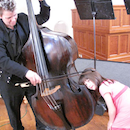
This year's Philharmonia Baroque Orchestra free family concert on March 8 features a lively program of music, discussion, and a post-concert "petting zoo," where children can view period and historically accurate instruments up close.
The fourth annual family concert at Berkeley's First Congregational Church will be a mash-up of 17th-century music from the heart of Europe, said the orchestra's executive director Michael Costa. An estimated 18 musicians, string players, and keyboardists from the core 25-member orchestra, will participate in the performance. Energetic works by composers and rock stars of their day Georg Philipp Telemann, and Johann Heinrich Schmelzer form the one-hour program, that will close with Johann Pachelbel's Canon in D.
The two works featured by Telemann and Schmelzer were chosen because they're pieces that draw on various geographical locations in Europe for their inspiration, said Costa.
The concert's spin on a traditional lecture-demonstration model is an interactive finale during which the children will be able to play their own instruments, which they have brought with them, or sing-along with the Pachelbel Canon, as well as chat with orchestra members.
"We don't think all children come in with a knowledge of the instruments or a concept of what is an historically accuarate instrument," Costa said, referring to the ensemble's collection of prized antique musical instruments that form the Philharmonia Baroque Orchestra Period Instrument Trust. Many orchestra members perform on instruments on loan from the trust, such as the c.1660 violin Elizabeth Blumenstock plays, built by Andrea Guarneri in Cremona, Italy.
Quite often children at the family concerts are intrigued by unusual looking instruments they've not seen before, Costa said, citing the theorbo, a type of European lute. A product of the Florentine Renaissance, the theorbo has a deep, powerful sound. It's played like a guitar. With a long neck, some reaching six feet in length, the instrument most likely was created to provide the bass range, one the then-popular tenor lute didn't reach.
Adults are invited to the concert, but only in the company of children ages 4-11. The orchestra is targeting a young audience because it is already active with outreach programs for older students, including those at the college level.
"We found we had this gap with the younger ages," said Costa. "The earlier children are exposed to classical music then the more time there is for them to develop a love for it and the possibility to pursue instrument studies or another musical pursuit."
Performances like the orchestra's family concerts pass along a legacy of classical music to future generations, according to Costa. "We're trying to reach students and trying to get them excited about the kind of music that we do and to also understand about these instruments and their history.
"It's music that fits into an historical context," he continued. "I think it's a cool factor."
Free tickets should be reserved in advance by visiting www.philharmonia.org. All adults must be accompanied by a minor.

